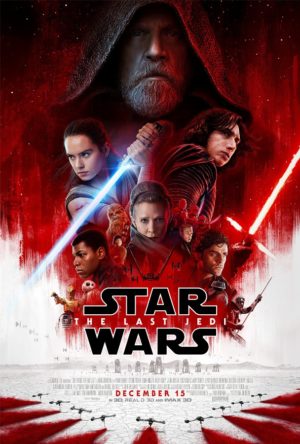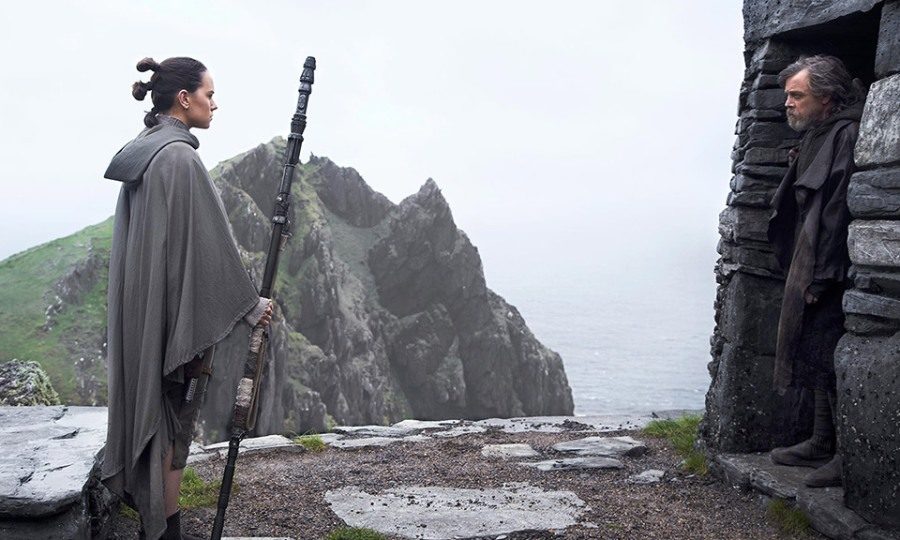J.J. Abrams, you’re my only hope
Rian Johnson makes a mess of ‘The Last Jedi’
Rey (Daisy Ridley) and Luke Skywalker (Mark Hamill) meet for the first time. Rian Johnson’s “The Last Jedi” is plenty daring, but offers nothing resembling a logical sequel to Episode VII.
Major spoilers ahead, though the movie is such a downer, I’d suggest throwing caution to the wind. If anyone unearths Disney’s bribing scheme, let me know, because the 93% on Rotten Tomatoes and 86% on Metacritic have got to be lies. The discrepancies with the audience scores are also especially telling, with a hot 56% on Rotten Tomatoes and whopping 4.9 of 10 on Metacritic. (And we’re kidding about the bribing. Mostly.)
When the trailer for the newest “Star Wars” dropped, it generated a lot of buzz regarding this film being a “darker” take on the franchise. They weren’t wrong. “The Last Jedi” has definitely cast a shadow on the promising start of the new trilogy. And the source of the problems, while worsened by shoddy effects, awkward editing, and an overly long runtime, all stem from one place: the story.
Rian Johnson (“Looper,” “Brick”) both wrote and directed Episode VIII. His writing process in itself raises some red flags — one being that much of “The Last Jedi” was penned while “The Force Awakens” was still being filmed. While not necessarily in Johnson’s control, this alludes to a tight schedule kept by Disney and Lucasfilm, which clearly didn’t leave room for critical thinking regarding content. In the simplest terms, the newest “Star Wars” refuses to act as a sequel to its own predecessor, making reckless decisions that don’t pay off, and perhaps even worse, constantly undermine the film’s own attempts at consistent, quality storytelling.
J.J. Abrams’ Episode VII was endlessly criticized for playing it safe and echoing Episode IV too closely. Johnson surely won’t pick up any of the same criticism, given all the “bold moves” he’s been undeservingly praised for, but simply being “so different from the last one” doesn’t equal an artistic success. It makes for confusion, a cacophony of a movie trying to be a million different things at once while failing to accomplish the most basic things it owed to its fans, as well as the characters and story that were so carefully crafted in the previous films.
The movie follows the barely surviving Resistance struggling to keep out of the grasp of the First Order. Commander Poe Dameron (Oscar Isaac) and Vice Admiral Amilyn Holdo (Laura Dern) butt heads under the leadership of General Leia Organa (Carrie Fisher). Ex-stormtrooper Finn (John Boyega) and newcomer Rose Tico (Kelly Marie Tran) assist Dameron by tracking down a codebreaker. All the while, strong-with-the-Force Rey (Daisy Ridley) seeks the help of Jedi Master Luke Skywalker (Mark Hamill) to bring an end to the fighting.
Johnson’s story gets viewers from point A to point B, but the content is questionable to say the least. While the characters are poised to wrap up their storylines in Episode IX (for which “The Force Awakens” director JJ Abrams is thankfully returning after the firing of Colin Trevorrow), the way Johnson gets them there is enough to make your skin crawl.
“The Last Jedi” needed to do a few things. First, it was paramount to advance the new characters, entrench them further in the universe, and dig into their motivations. Second, Luke Skywalker’s character needed a meaningful presence that made sense with what the audience already knows about him. Third, “The Last Jedi” needed momentum. It needed a plot that didn’t feel like a placeholder, wasn’t oversaturated, and left room for delicate exploration of characters in peril. “The Last Jedi,” in frightening form, does none of this.

Rey, the strong-willed, promising protagonist that we knew from “The Force Awakens” is nowhere to be seen. She’s sidelined within her own arc to make room for the villain, Kylo Ren (Adam Driver) and his emotional baggage. “The Last Jedi” introduces a Force-connection between the two that’s horrifying to watch (it’s essentially Jedi face-timing, and it’s the most distracting, out-of-place thing ever, using a jarring shot-reverse-shot technique that’s not at all like the connections we’ve seen in previous installments). And “The Last Jedi” really committed to this idea: the main driving force of the film is Rey’s sympathy for Ren, her belief that she can turn him to the light.
It feels extremely dishonest to Rey’s character. There’s no apt justification regarding why her moral compass would operate this way, especially considering she witnessed Ren kill his father, Han Solo, in the previous episode. There was immense emotional weight to that moment, and “The Last Jedi” completely throws it away in favor of something supposedly edgy and risk-taking. Further, the “there’s still light in him” syndrome is a direct copy and paste of Luke’s attitude toward Vader in “Return of the Jedi” — a sentiment he only reaches once he knows the Sith to be his father. But Rey isn’t Luke, and this lazy characterization is a shame. Kylo’s character, and the duality between him and Rey, could’ve been explored in a much subtler way, a way that didn’t tear down Rey, a character who fans have come to know and love.
Finn’s treatment especially stings. John Boyega’s charisma and Finn’s unique backstory added dimension to “The Force Awakens” that was arguably one of the main reasons the film was able to stand on its own, and his character is barely touched in “The Last Jedi.” He’s given this odd subplot that keeps him far from the main action, in which he and Rose venture to an aristocrat-filled casino to find help for the Resistance. It’s not necessary to the film and carves too many subdivisions into the plot structure that the film just can’t keep up with. Finn is done a great disservice, demoted from leading man to minor character amid all the noise that is “The Last Jedi.” As a result, Finn and Rey’s reunion at the last possible minute in the film feels unearned, leaving fans wondering why were these two characters weren’t even in the spotlight of their own film.
And then there’s Luke Skywalker. To be fair, it’s impossible not to anger at least some fans when interpreting this character, who’s so ubiquitous in pop culture, and who so many people hold so dear. It’s tempting as a viewer not to quibble, to take Mark Hamill’s exceptional reprisal of the role, and just be content. But a lot doesn’t add up.
There’s a really underwhelming justification for his decade-long absence. He’s understandably jaded, but it’s not for the reasons that would make sense given his values. Skywalker’s concluding acts aren’t clear in how they serve his journey as a character. The whole final battle, in fact, is so ridiculous that it almost doesn’t even register as happening. Again, even if you put his characterization completely up for debate (a characterization, keep in mind, Mark Hamill himself was initially less than thrilled with), Luke’s arc doesn’t really give him much justice because the film deprives him of a meaningful role as a mentor to Rey, whose relationship to Kylo is treated as more principal. There’s no concern for his character and no room for him to serve the story.
Structurally, the film runs into some roadblocks that are pretty inexcusable for a feature with such high expectations attached. The first thirty minutes are palatable. It feels like we could make a pretty good Star Wars film out of it, despite a few creative missteps. There’s some space battles. It’s all fun and games. And then there’s a drop off.
Once the Ren-Rey dynamic becomes the centerpiece of the film and Finn is banished for the entirety of the second act, it’s hard to persevere through the film. Just when tension is supposed to be building and a resolution needs to be on the horizon, “The Last Jedi” makes all of its fatal mistakes. The final bit is overindulgent and senseless, feeling more like a video game than a movie. “The Last Jedi” tries so hard and is somehow the most boring “Star Wars” flick yet. It feels as if it’s struggling to hold together. It’s labor to get through, and yet you come out of the theater feeling like nothing even happened.
The best case scenario from here is that Abrams picks up the pieces and concludes the trilogy in a way that’s deserving in Episode IX, but a lot of damage has already been done. “Star Wars” is too fundamentally driven by character journeys for Rian Johnson to make the shortcuts that he did. “The Last Jedi” isn’t repugnant or unwatchable — just a lost opportunity. Episode VIII could have done everything it did to push boundaries while still maintaining meaning, but it didn’t. It lacks an understanding of why people watch “Star Wars” and instead opts to compensate with a flurry of empty spectacle.
The newest installment takes risks, sure. But this isn’t Rian Johnson’s passion project, it’s a “Star Wars” film. The characters, not the twists and turns, are the single most important part of the equation. It’s almost funny: there are all these think pieces about how the film’s jarring, Marvel-esque sense of humor is among the best changes Johnson made. Jokes are surely a key component in the making of a “Star Wars” movie, but the lines many critics reference as brilliant are so self-aware that they write the scathing review themselves. They reveal how Johnson’s interpretation puts everything, including our heroes, just out of sync.


